The content of the article
- 1 How olives differ from olives
- 2 Composition and calorie content
- 3 Why canned olives are healthy?
- 4 Canned Olives in Medicine
- 5 Harm and contraindications of canned olives
- 6 Culinary olives
- 7 How to choose and store canned olives
- 8 Interesting facts, myths and legends about olives
- 9 Video: how olives and olives are useful
Canned olives are a product with an unusual taste, which is often present on holiday and everyday tables of Russian residents. The astringency of olives complements alcohol, elegantly combines with cheeses and vegetables, and also fits perfectly into multi-component snacks. But the uncontrolled use of a mysterious product can adversely affect health. Familiarization with the benefits and harms of canned olives for adults and children is a must for anyone who cares about their well-being!
How olives differ from olives
The most common misconception regarding olives is that black olives belong to a different kind of plant and are removed from other trees. Also, some believe that olives are olives colored by chemistry, and therefore more harmful.
Important! Olives and olives are the same fruits that are taken from the same tree, but undergoing different processing. Moreover, the concept of "olive" is used only in the territory of the former USSR, in Europe they are called black olives.
Fresh olives are unsuitable for use as snacks - they are very bitter. Therefore, a canned product is used in most cases, it differs only in manufacturer and quality. And fresh fruits are used only for the extraction of healthy oil.
Features of growing olives
Tart delicacy grows in the south of Europe and Asia, as well as in Africa. The olive tree is an evergreen plant of the genus Olive. Harvest fruits before ripening and send for conservation. A fresh appetizer is harder than canned and different in color - ripe fruits are brown and dark purple.
The methods of collecting the plant are also different: the unripened olives are picked by hand and placed in baskets, and the ripe ones are simply shaken off the tree on hammocks stretched near the ground.
How do olives turn black?
The marinade gives a dark shade to the fruits. Before preservation, they undergo calibration: some of the fruits are sent to the marinade immediately to maintain their natural shade, the rest are sent to cans, where they lie under compressed air for 10-12 days and turn black. Then the olives are sent to the brine.
First, the raw materials are stored in large tanks connected to each other and located underground to maintain a constant temperature. For further processing, the fruits are pumped out with an air pump and processed: the bones are removed, stuffed. At the same stage, they are calibrated. On sale you can find crayons and large olives.
Erroneous opinions
There are 4 misconceptions regarding black and green olives:
- Blacks contain fewer nutrients. With the same treatment, both species retain the same amount of minerals, vitamins and fatty acids.
- Black contains more dyes and preservatives. In fact, food coloring is not added to the brine.
- Black has too much iron gluconate. During oxidation, compressed air is supplied to the tanks, as well as less than 1% iron, which improves the blackening of the olives. It is safe for health.
- Black olives are ripe. In fact, black and green appetizers have the same degree of ripeness. Their hardness is regulated by different concentrations of salts in brines.
Thus, black and green fruits are the same in terms of nutrients, ripeness and quality. However, they differ in color, brine composition, processing technology and consistency.
Composition and calorie content
If you carefully consider the balance of nutrients in olives, you can find the following:
- most of all 100 g of the product contains fat - 14 g;
- proteins they contain only 0.5 g;
- carbohydrates in the composition of the product 0%;
- up to 70 g is water;
- as well as 2.2 g of fiber - dietary fiber.
Canned olives contain many vitamins, but the leader among them is E - 22.7%, or 3.4 mg. The second place is occupied by vitamin A - 25 mcg.
Mineral content in olives:
- Potassium - 42 mg.
- Sodium - 1566 mg.
- Calcium - 52 mg.
- Magnesium - 11 mg.
- Phosphorus - 4 mg.
- Iron - 0.49 mg.
- Copper - 0.12 mg.
- Zinc - 0.04 mg.
- Selenium - 0.001 mg.
Olives are rich in fatty acids, most of all they contain Omega-6 - 1.215 g per 100 g. Also in the composition are 0.092 g Omega-3, 11 g oleic, 1.2 g linoleic, less than 1 g - stearic, palmitoleic, gadoleic and linolenic acids.
In black fruits, the content of substances differs slightly.
Why canned olives are healthy?
The combination of trace elements in a canned snack makes it good for health when consumed in moderation and in the absence of contraindications. Here is what olives are capable of:
- They help fight bad cholesterol.
- Participate in the regulation of pressure.
- They cleanse and strengthen the walls of blood vessels, protect against the formation of atherosclerotic plaques.
- Protect the heart, prevent the appearance of blood clots.
- They have a positive effect on brain function, strengthen memory, increase the activity of the main nerve center, and improve concentration.
- The content of healthy fats and antioxidants allows you to fight with the formation of mutated cells, thereby preventing the development of tumors.
- Normalize the work of metabolism, well satisfy hunger and help to fight excess weight.
- Fiber has a positive effect on digestion, eliminates constipation, flatulence.
- They help normalize the intestinal microflora, preventing dysbiosis.
- Participate in the removal of harmful substances from all organs and systems.
- Strengthen the nervous system, help fight apathy, stress, depression.
- Improve visual function.
- Strengthen the immune system.
- Participate in the fight against inflammatory processes.
One can single out the benefits of canned olives for men, women and children.
For men
For men's health, the fruits are especially useful for the following:
- Vitamin E maintains sperm quality, improves blood circulation and protects testosterone from degradation.
- Healthy fats normalize the state of blood vessels, thereby increasing sexual function.
- The combination of vitamins B prevents baldness and improves the growth of new hair.
- Zinc is essential for testosterone production.
To combat “male” disorders and diseases, patients are advised to include 10-15 olives daily in the diet.
For women
The female body also benefits greatly with regular use of olives:
- The condition of hair and skin is normalized, wrinkles are reduced, inflammations from the face pass, and the growth of nails and hair improves.
- Teeth and bones are strengthened, this is especially important during the period of bearing and feeding the child, as well as with menopause.
- Healthy fats and antioxidants have a positive effect on fertility.
- B vitamins protect against varicose veins and help fight it.
And low-calorie snacks fit perfectly into any diet program!
In a moderate amount, you can eat olives during pregnancy, if there are no contraindications. This product is considered hypoallergenic, it normalizes fat metabolism and improves the construction of new cells, which is extremely important for the development of the embryo. However, olives should be consumed only after 1 trimester of pregnancy.
For kids
The greatest benefit of the fruit for the child's body is to regulate the levels of calcium, phosphorus and potassium. These elements are necessary for the development of strong bones and cartilage, as well as for the formation of muscle corset.Vitamins A and E have a positive effect on eye and skin health.
Seed features
The seeds contain the same beneficial elements as the pulp of the fruit. They are recommended to be used in the form of ground powder. Here are the benefits of seeds:
- They help fight alcohol intoxication, remove harmful substances.
- They have antioxidant properties.
- A specific feature is that the bones can be used as a natural sorbent to cleanse the urinary system and gall bladder from sand, small stones and other deposits.
- They help fight respiratory problems.
- They have enveloping properties, protecting the stomach from erosion and ulcers.
It is forbidden to use crushed or whole bones - they can get stuck in the intestinal passages and other parts of the excretory system.
Canned Olives in Medicine
Olives are used in a therapeutic diet for various diseases:
- atherosclerosis;
- cardiovascular pathology;
- disorders of carbohydrate or fat metabolism;
- diabetes and high blood glucose;
- disturbances in the work of the nervous system;
- anemia;
- arthritis, osteochondrosis and other diseases of the joints and bones;
- digestive problems, especially: constipation, bloating, flatulence;
- obesity;
- infectious diseases.
Before including olives in your daily diet, you should consult your doctor.
Harm and contraindications of canned olives
It is forbidden to add olives to the diet if there is one or more diseases:
- cholecystitis;
- pancreatitis in a chronic or acute form;
- gastritis with high acidity;
- cystitis;
- confirmed kidney stones;
- heart or kidney failure;
- hypertension, coronary heart disease;
- allergic reactions: rash, itching, trouble breathing.
It is forbidden to eat olives to people who are recommended salt-free diet.
Important! Olives are hypoallergenic products, but in rare cases, people may show a negative reaction to them. Diarrhea after eating snacks is the main symptom of such an allergy.
Excessive consumption of olives can also be harmful, especially if sodium glutamate, preservatives and other additives are present in the composition. Since the product belongs to canned food, the risk of poisoning due to container leakage and improper storage remains.
Culinary olives
The taste of olives depends on the size of the fruit. The most delicious foods are those with a small bone and a lot of pulp. The taste may vary depending on the brine. Dark fruits are more soft, while green fruits are sharp, sharp, piquant. In cooking, an appetizer is used in different ways:
- combined with cheeses and other types of cold snacks;
- served with alcohol, they are best suited to white wines and vermouth;
- black olives are used for white and pink wines;
- You can add the product to meat, fish, seafood;
- olives are used to make sauces and fillings for pastas, pies;
- add them to stews, pizza, rolls;
- stuffed with olives tartlets and canapes.
Small fruits are perfect for chopping, and medium fruits for making sauces and pizza. Large ones are most often used for decorating dishes and stuffing.
An olive appetizer is in demand all over the world: in South America, fruits are added to stewed tomatoes and sweet peppers, in Mediterranean fear they are eaten with cheeses, and salads are prepared with them in the Arab states.
How to choose and store canned olives
The first thing you should pay attention to when choosing a product is the production date and expiration date. An appetizer without preservatives is stored up to 6-12 months, while processed with chemistry - up to 3 years.
Advice! Choose black olives with pits, as seedless fruits are prepared using chemistry.
A stuffed product is the most undesirable to purchase.The safety of the filling in brine always requires the use of additional preservatives, which affects the quality of the product. There is also no certainty that only fresh ingredients were used for the filling.
Follow the following step-by-step technology for choosing quality olives:
- Inspect the packaging. The bank should not be rust and deformed areas.
- Select country of origin. The best products are made in Italy and Spain.
- Read the composition. The abundance of additives, except salt and water, indicates a poor quality product.
- The absence of impurities. The brine in a glass jar should be clean, not muddy, and olives - whole, not torn.
After opening the can, pay attention to other parameters. Fruits should be uniform in size, without significant damage. The smell of brine is delicate, with a slight bitterness, without extraneous aromas. The consistency of the fruit should be elastic and dense, and the color should be from green to dark green.
Product Storage Features
After opening the cans, it is important to store the olives correctly. First read the manufacturer's instructions on the packaging, if any. It is advisable to use the product after opening the package for 1-2 weeks, but only if the following conditions are met:
- Olives are transferred to a food container from an iron can, or stored in glass.
- Pour on top with salt water (1 l 2 tbsp. Salt).
- They put the jar in the refrigerator. You can add 3-4 drops of lemon juice to maintain freshness.
- You can get olives only with a dry spoon or fork.
- When plaque or clouding of the brine occurs, the product cannot be eaten.
- Olives should be stored under a tightly closed lid, otherwise they will absorb foreign odors and deteriorate.
If you leave the product in the bank, then it will lose its properties the next day.
Interesting facts, myths and legends about olives
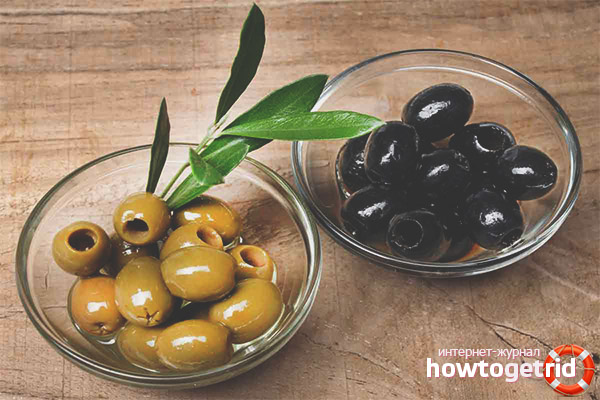
Canned and fresh olives - one of the first products that began to be grown by man. Images of this product are found on ancient Egyptian vases and amphorae, and the ancient Greeks associated it with the goddess of wisdom - Athena.
Fact! The first olive trees people began to grow in Crete for 3000 years BC.
Olive tree can live more than 2000 years. In Israel, such trees bloom on the Mount of Olives. The average plant duration is 500 years.
Up to 90% of the olive crop is used to produce refined and unrefined oils. And trees are grown for export mainly in the Mediterranean region.
Canned olives are affordable, tasty and healthy when consumed in moderation. However, even its hypoallergenicity does not give the right to people with chronic diseases to add olives to the diet without consulting a doctor. Choose the right products, store them in accordance with the requirements and enjoy the tart taste!
Video: how olives and olives are useful

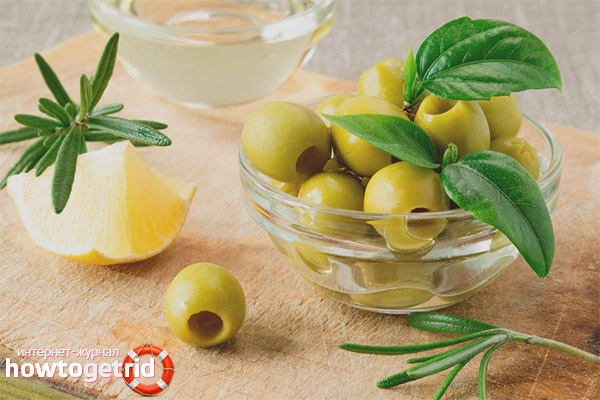
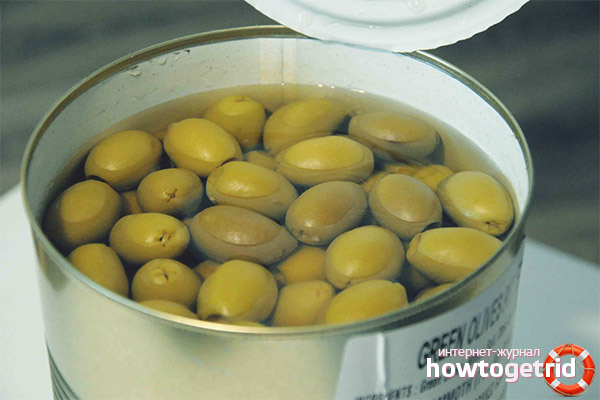
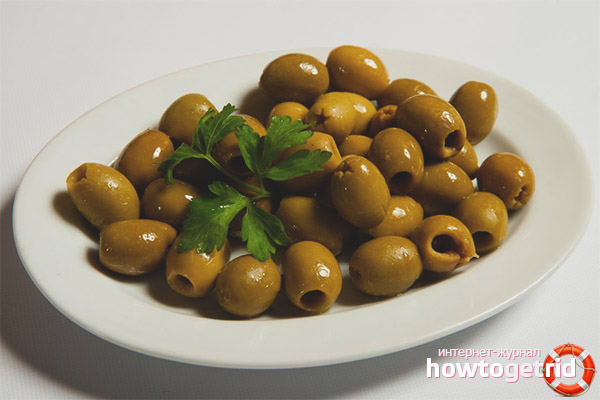
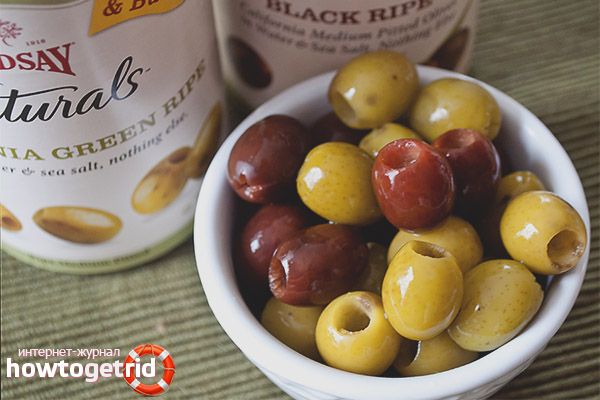
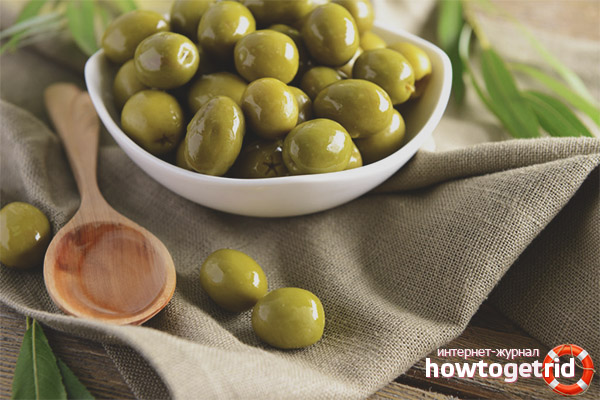

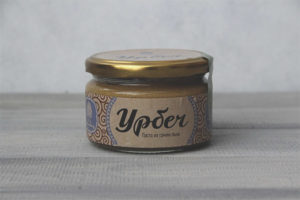






Submit